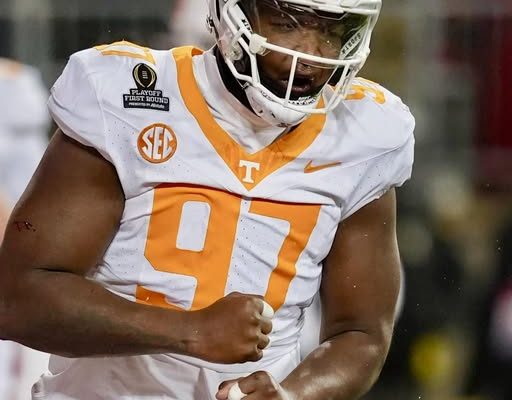Great news has arrived in Tallahassee ahead of the 2025 college football season, and it comes in the form of added depth and power to Florida State’s defensive line. On Thursday morning, Seminoles head coach Mike Norvell announced that Tennessee defensive end transfer Jayson Jenkins was a full participant in practice, marking a significant step forward for both the player and the program as they continue to gear up for what is shaping up to be one of the most anticipated seasons under Norvell’s leadership.
For Florida State fans, this is more than just a roster update—it’s an infusion of talent into a defensive unit that already boasted high expectations. Jenkins, who arrived from Tennessee with notable SEC experience, brings with him the type of physicality, length, and high motor that defensive coordinators crave. Standing 6-foot-6 and weighing in at over 260 pounds, Jenkins has always been considered a high-upside player. Injuries and depth chart congestion limited his visibility at Tennessee, but there was no questioning his potential. The fact that he’s now fully cleared and participating at full speed is exactly what FSU needed to hear, especially as they look to replace outgoing talent and reload for a run at the College Football Playoff.
Norvell’s update couldn’t have come at a better time. The program has spent the summer managing expectations while trying to integrate new pieces into both sides of the ball. Jenkins, who transferred in during the offseason, had been working through conditioning and recovery protocols since his arrival. That he is now officially a full go for practice means he’ll have ample opportunity to carve out a meaningful role in defensive line coach Odell Haggins’ rotation. And based on his physical tools and Norvell’s praise of his work ethic, there’s little doubt Jenkins will make the most of it.
Jenkins’ addition also helps address one of the few question marks on this 2025 Seminoles team. While the offense, powered by a returning quarterback and a stacked receiver corps, is expected to light up the scoreboard, questions remained about whether the defense would be able to hold its own against top-tier competition. Losing players to the NFL Draft and graduation had opened up opportunities—and concerns—along the front seven. But the emergence of Jenkins as a healthy and available option helps to stabilize that group. His versatility is particularly important; Jenkins has the size to play with his hand in the dirt and the agility to operate in hybrid looks, which Norvell and defensive coordinator Adam Fuller have increasingly relied on.
There’s also the leadership angle to consider. Jenkins, though not a product of the Seminoles’ system, brings with him the experience of playing under pressure in the SEC and competing against top-tier offensive lines. While he might not walk into a captain’s role, his presence alone elevates the competitiveness in practice and sets a tone for younger players. This is particularly useful in a program that continues to build its identity under Norvell—one based on resilience, preparation, and relentless energy.
Florida State’s coaching staff has long emphasized the importance of practice tempo and competition. Having Jenkins out there with the first and second-team units raises the floor of those reps. It gives Norvell and Haggins a chance to experiment with combinations—perhaps pairing Jenkins with returning veteran edge rushers or sliding him inside on passing downs to exploit mismatches. The versatility Jenkins brings allows for more aggressive playcalling and creative alignments, something that could prove crucial in big matchups, particularly early in the season.
Recruiting-wise, this is also a positive signal to current and future transfers. The fact that a player can come into the program, receive medical and developmental support, and get fully integrated in time for the season is a testament to FSU’s infrastructure. In the modern era of college football, where the transfer portal plays as big a role as high school recruiting, demonstrating the ability to quickly and effectively onboard high-impact players is a major win.
Jenkins now becomes one of the names to watch during fall camp. Media and fans alike will be looking to see where he lines up, how many reps he gets, and how quickly he adapts to the Seminoles’ system. More than anything, though, they’ll want to see whether he can deliver on the promise he showed as a recruit and sporadically flashed at Tennessee. The ingredients are all there: size, speed, and now, health. With Norvell confirming he’s fully cleared, the stage is set.
For Jenkins, this represents a chance at redemption and resurgence. For Florida State, it’s a well-timed reinforcement at a key position group. And for Seminole fans dreaming of playoff contention in 2025, it’s one more reason to believe that this team is built to make a serious run. As Norvell continues to build a championship culture in Tallahassee, the return to full health of a physically gifted SEC transfer like Jayson Jenkins may prove to be more than just good news—it might be one of the quiet catalysts for a season to remember.



